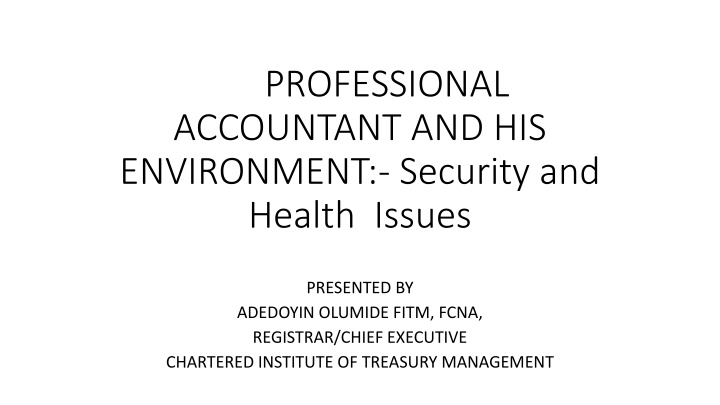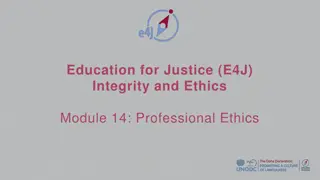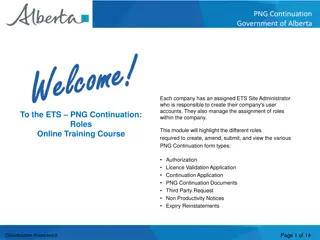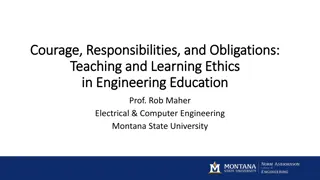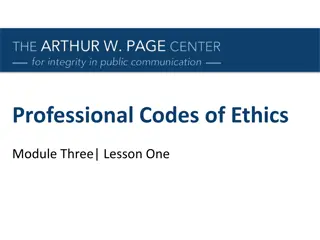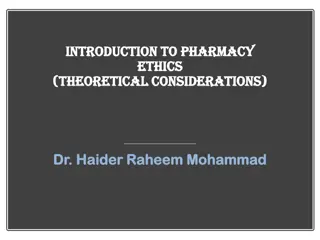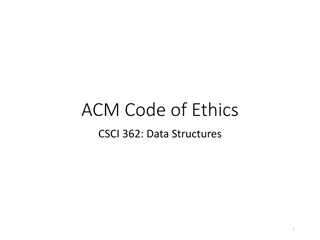Professional Accountant: Roles, Ethics, and Responsibilities
A professional accountant, recognized for expertise in accountancy, upholds standards of integrity, objectivity, competence, and confidentiality. They must comply with ethical codes and assume responsibilities such as financial oversight and strategic guidance within organizations.
Download Presentation

Please find below an Image/Link to download the presentation.
The content on the website is provided AS IS for your information and personal use only. It may not be sold, licensed, or shared on other websites without obtaining consent from the author.If you encounter any issues during the download, it is possible that the publisher has removed the file from their server.
You are allowed to download the files provided on this website for personal or commercial use, subject to the condition that they are used lawfully. All files are the property of their respective owners.
The content on the website is provided AS IS for your information and personal use only. It may not be sold, licensed, or shared on other websites without obtaining consent from the author.
E N D
Presentation Transcript
PROFESSIONAL ACCOUNTANT AND HIS ENVIRONMENT:- Security and Health Issues PRESENTED BY ADEDOYIN OLUMIDE FITM, FCNA, REGISTRAR/CHIEF EXECUTIVE CHARTERED INSTITUTE OF TREASURY MANAGEMENT
Who is a Professional Accountant? A Professional accountant in a specified field is a candidate who has (or has acquired) the qualifications specified by the respective professional accounting body for being recognised as a professional in that field. futureaccountant.com A person who has expertise in the field of accountancy, achieved through formal education and practical experience and maintained through continuous learning and development; is held to high professional standards equivalent to the IESBA Code of Ethics for Professional Accountants and IAESB International Education Standards, and whose compliance with such standards is subject to enforcement by a professional accountancy organization or regulatory mechanism. - Proposed Definition of IESBA Working Group
Code of Ethics of a Professional Accountant Integrity - A professional accountant should be straightforward and honest in all professional and business relationships Objectivity - A professional accountant should not allow bias, conflict of interest or undue influence of others. Professional Competence and Due Care - A professional accountant has a continuing duty to maintain professional knowledge and skill at the level required to ensure that a client or employer receives competent professional services based on current developments in practice, legislation and techniques. A professional accountant should act diligently and in accordance with applicable technical and professional standards when providing professional services.
Code of Ethics of a Professional Accountant Confidentiality - A professional accountant should respect the confidentiality of information acquired as a result of professional and business relationships and should not disclose any such information to third parties without proper and specific authority unless there is a legal or professional right or duty to disclose. Confidential information acquired as a result of professional and business relationships should not be used for the personal advantage of the professional accountant or third parties. Professional Behavior - A professional accountant should comply with the relevant laws and regulations and should avoid any action that discredits the profession.
Responsibilities of a Professional Accountant As board directors: represent the interest of the owners of the company governing the organization (such as, approving annual budgets and accounting to the stakeholders for the company s performance); appointing the chief executive determining management s compensation. As chief financial officers: oversight over all matters relating to the company s financial health creating and driving the strategic direction of the business to analyzing, creating and communicating financial information.
Responsibilities of a Professional Accountant As internal auditors: provide independent assurance to management that the organization s risk management, governance and internal control processes are operating effectively offer advice on areas for enhancements. In the public sector: shape fiscal policies that had far-reaching impacts on the lives of many In academia: imparting the knowledge, skills, and ethical underpinnings of the profession to the next generation.
Responsibilities of a Professional Accountant Protectors of Public Interest A description of the multifaceted role of professional accountants in business is not complete without discussing the duty that the profession owes to the general public. As a profession that has been bestowed a privileged position in society, the accountancy profession as a whole deals with a wide range of issues that has a public interest angle. In the case of professional accountants in business, not only must they maintain high standards but they also have a key role to play in helping organizations to act ethically. Closely link to the protection of public interest is the notion that public accountants need to be trusted to provide public value. Accountants will lose their legitimacy as protectors of public interest if there is no public trust. The accountancy profession has wide reach in society and in global capital markets. In the most basic way, confidence in the financial data produced by professionals in businesses forms the core of public trust and public value.
Environmental Factors that Influence Accounting and Accountants 1) Accounting Standards (International IFRSs, IPSASs, and Local - NASs) 2) Generally Accepted Accounting Principles (GAAP) Accrual, Conservatism, Economic Entity, Going Concern, etc. 3) Economic Environment Inflation Rate, Established Standards, etc. 4) Political Environment Increase in Tax Rates, Waivers on some Products or Items, Tax Holidays, etc. 5) Social Factors Level of Education, Expectation from Stakeholders, Invasions, etc.
Environmental Factors that Influence Accounting and Accountants 6) Technological Factors Artificial Intelligence (AI), Block Chain, Big Data Analyzers 7) Legal System Company Act and Financial Acts 8) Taxation System Basis for liabilities, Taxation Agreements 9) Providers of Capital State or Individuals 10)Organization s Activities Manufacturing, Trading, or Agriculture
Security Issues in Accounting Environment Accounting information systems contain confidential and private information that can become compromised if left unprotected. Unauthorized use of an accounting system can be disastrous, risking the loss of information, bad data input, and misuse of confidential information. The security of accounting systems is a priority in many firms.
Security Issues in Accounting Environment Outdated Software Data Breaches Not Assessing Security Risks Data in Transit Remote Data Access Crypto Jacking Weak passwords Program Manipulation Misuse of Confidential Information Malware and Phishing Cloud Security Biometrics
Health Issues in Accounting Environment Mental Health Stress Depression Anxieties Sedentary Behavior (activities that do not increase energy expenditure substantially above the resting level) Diabetes Heart Problem Obesity
Health Issues in Accounting Environment Exhaustion Back Pain Waist Pain Eye Problem Lack of Happiness or Joy
Ways Forward Security Issues Accounting, like other social science disciplines and human activities, is largely a product of its environment. Accountants should continue to update themselves on the key issues of social-economic, political-legal conditions, constraints, and influences which varies from time to time. There is a need for accountants to examine the potential for security breaches both in the local offices and especially online. Security issues identified should be discussed with the management in a timely manner to avoid loss of confidential information Necessary protections should be put in place to safeguard company data.
Ways Forward Health Issues While responsibilities, there s much to be said about taking time to yourself and paying attention to your physical and emotional well-being. Engage in physical exercise regularly Carry out routine medical check-ups Intermediately walk round after every 2 hours of sitting down with a computer Using screen protective glasses there s no particular way to lighten your
Conclusion Professional accountant work is very demanding in this present world of technology. An accountant needs to work hard to make himself relevant and needed. Training and retraining on different environmental issues affecting the profession as well as guidelines and pronouncement must be a priority. Despite the above, it will be detrimental for an accountant to ignore the risks of exposure to breaches in security systems relating to his working environment and for him to forget his health issues. All hands should be on deck as we do our best in promoting this profession of high ethical values.
